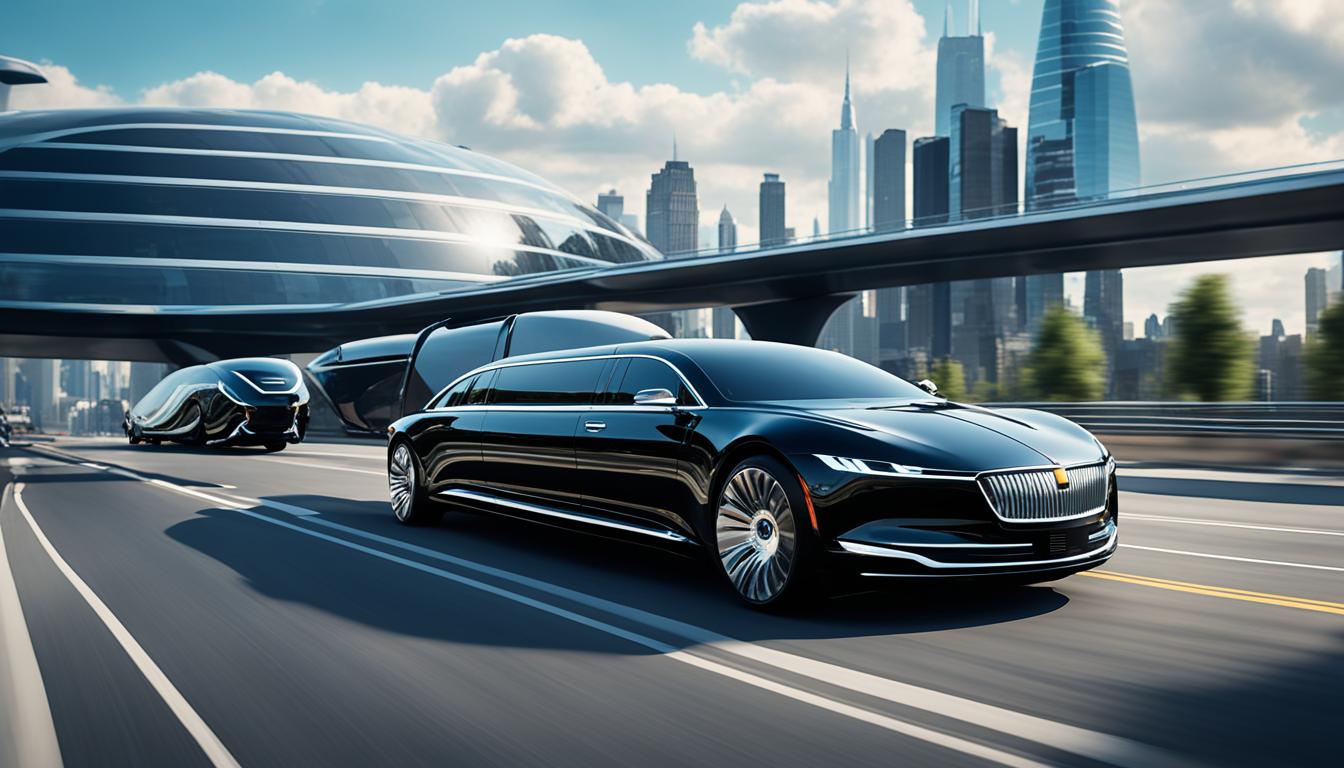The Future of AI in Transportation: AI Application Use Cases for Premium Limo Rides
Did you know that by 2025, the luxury vehicle sector will fully adopt artificial intelligence (AI)? This shift means big changes for transport in premium limo services. Now, clients will enjoy a travel experience that’s both high-tech and seamless.
Limousine companies are using AI to make everything smoother. This includes dispatching rides automatically and keeping track of their fleets. Each customer gets a personalized experience thanks to AI. This technology also helps make better decisions through careful data analysis.
With AI’s help, limos can pick the best routes. They spot traffic snarls and update their plans in real-time. This results in faster and more dependable rides. AI is also behind many special features. Think of tracking flights, setting fair prices for different clients, and keeping all the money details straight.
Key Takeaways
- AI-powered transportation solutions are transforming the luxury limo industry, offering a seamless and tech-driven travel experience.
- Limousine businesses leverage AI for automated dispatch, fleet tracking, personalized customer experiences, and data-driven decision-making.
- AI algorithms optimize routes, analyze traffic patterns, and provide real-time updates for efficient and reliable service.
- Limo dispatch software with AI integration offers features like flight tracking, personalized fare rates, and consolidated revenue analysis.
- The integration of AI in limo services enhances safety, reduces emissions, and provides a seamless, tech-driven travel experience.
Thanks to AI, taking a limo is safer and more eco-friendly. It also means smoother rides for people who love luxury. By staying at the forefront of technology, AI lets limo companies offer top-notch service and innovation.
24/7 Availability for the Transportation Industry
AI-powered limo services guarantee you can book rides anytime. They use advanced algorithms to study real-time data. This includes traffic and driver status. This allows for quick service, even in busy times or sudden events. Using AI helps avoid delays and issues with transport, leading to a reliable and smooth luxury travel experience.
Transportation with AI technology is always available, 24/7. It uses complex algorithms to quickly process big data. These algorithms predict and prevent traffic problems, choosing the best routes. This approach means less chance of delays, offering a hassle-free ride.
AI also helps with keeping vehicles in top condition. It can find possible car issues before they happen. This avoids car problems during busy times. Therefore, your limo service becomes even more reliable and consistent.
This eye-opening video explains how AI in transportation is changing our world…

Experts foresee big changes in supply chains thanks to AI. The transportation sector is embracing this change. AI-driven limo services lead, providing round-the-clock availability. They cut down on traffic issues, ensuring a smooth trip for customers.
AI-driven systems provide 24/7 availability, enabling uninterrupted work, minimizing risks associated with delays, gridlock, and unreliable transportation.
AI is reshaping how we see transportation services. It’s more than just being convenient. It’s about setting a new standard for dependability and readiness. By using the latest in algorithmic science and related research, AI is transforming travel services. This helps meet the evolving needs of transportation users.
Efficient Booking Process with Artificial Intelligence
You, a smart client, want easy and useful luxury transportation booking. Limo businesses use smart tech like AI for simple booking through recommendations and automation. This way, you can easily find the best rides for your needs, schedule, and situations.
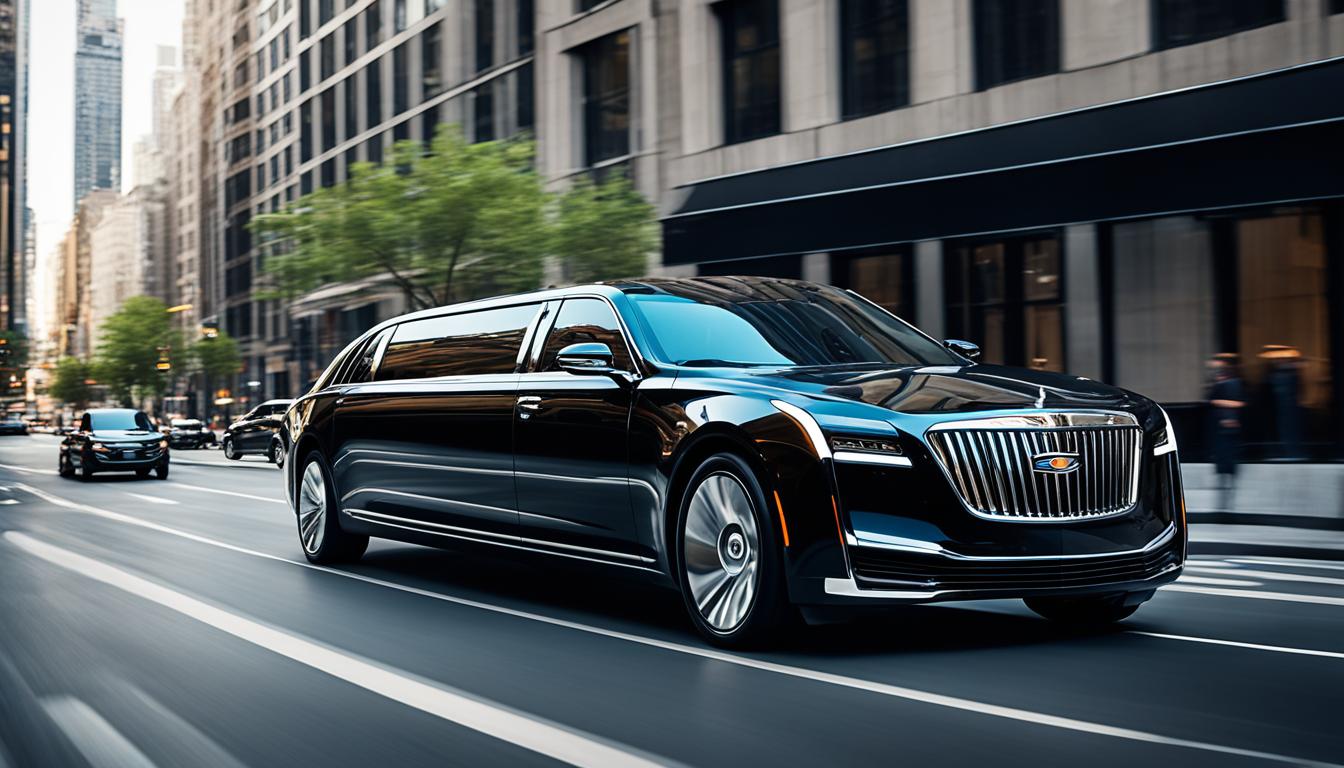
Thanks to AI, booking is smoother and supports driving help features. This helps with eco-friendly travel and saves on costs through automation. So, you get great service and help the planet, all at once.
Hopper app, a pioneer in AI-powered travel, has sold over $600 million worth of flight tickets since its inception, showcasing the remarkable impact of seamless booking experiences enabled by artificial intelligence.
AI platforms analyze what you need, considering where you start, where you’re going, and what you want. Then they suggest rides that fit your needs, removing the need to look through many options. This saves time and makes choosing easier.
| Traditional Booking | AI-Powered Booking |
|---|---|
| Manual search and comparison | Personalized recommendations |
| Limited visibility into real-time availability | Transparent, up-to-date ride options |
| Potential hidden costs | Cost optimization through AI analysis |
| Limited customization options | Tailored experiences based on preferences |
Also, AI in booking platforms boosts driving safety and comfort. Systems use algorithms to watch driving, road conditions, and risks. They warn and help your driver in real time.
Limo companies use AI to transform booking, giving you unmatched ease, saving money, and being eco-friendly.
Real-Time Traffic Flow Updates
Imagine riding in a limo in bustling NYC, everything perfectly planned for your airport transfer by AI. You sit back, enjoying the ride, while staying updated on traffic and arrival times. This magic comes from combining neural networks and traffic simulation.
Iteris is at the core of this, handling lots of GPS data to give real-time traffic updates over 3.8 million miles in North America. It uses a deep learning model with 12 layers and 20 million parameters. This model matches descriptions to Alert-C event codes for fast incident response.
Iteris’ AI runs on 16 million stored incidents, using 80% for training and 20% for checks. They store over 20,000 incident details, updated by an AI model. This ensures efficient response and maintenance.
The evolution of AI technology is driven by a powerful trifecta: robust computing resources, advanced algorithms, and an abundance of digital data.
Iteris leverages data such as SPaT, incident reports, and GPS info to predict travel delays. Their system helps make better estimates of trip times, making luxury commutes easier to plan.
| Feature | Benefit |
|---|---|
| Real-time traffic data | Covers every road, from interstates to neighborhoods |
| Lane-by-lane speed details | Informs drivers when to switch lanes for faster, safer trips |
| INRIX Road Weather | Alerts drivers to dangerous weather-related road conditions |
| Rapid slowdown alerts | Reduces the risk of rear-end collisions |
Iteris’ AI has been taught with trillions of data points from the last 10 years for precise speed info. It works with any digital map or device, ensuring computer security and meeting public policies for the transportation sector.
Future of AI Personalized Experience

In the transportation industry, AI is transforming limo services. They provide experiences made just for you, thanks to machine learning algorithms and real-time data analysis. Limo companies understand what you need, adjust in-car features, and suggest the best things to do or eat.
AI doesn’t stop there. It also works with traffic management and transportation systems for smooth rides. Imagine hopping into an autonomous vehicle that knows it all. This is the future – convenient, safe, and lavish.
Industry experts say by 2030, about 15% of new cars could drive themselves. This is all thanks to better AI and problem-solving skills.
For now, limo services offer something truly special. They use AI systems and real-time info to make your ride just right. From what you watch in the car to where you have dinner, it’s all about you. This level of care turns a simple ride into a luxury journey.
| AI Benefit | Impact |
|---|---|
| AI-driven route optimization | 10-40% reduction in delivery costs |
| AI-based traffic management systems | Up to 25% reduction in travel times |
| Predictive maintenance driven by AI | 5-10% reduction in maintenance costs, 10-20% increase in equipment availability |
AI in transportation goes beyond ease. It’s about making things safer, more efficient, and cleaner. As autonomous vehicles grow, so will AI’s role in fewer accidents, less traffic, and better gas mileage.
- AI makes roads safer by keeping you up to date on real-time traffic and dangers.
- Using AI to predict issues can prevent many breakdowns and delays.
- AI chatbots are making customer service better by being faster, and more personal.
Benefits of AI for Enhanced Communication
In the transportation sector, AI technology is changing how we talk to each other. AI apps and chatbots with Natural Language Processing (NLP) let people easily use AI. They can order a ride, change it, or get updates just by talking or typing.
These AI tools don’t just make things easier for us. They also help the environment and make roads safer. They share the latest on traffic so routes can be planned better. This cuts down on waiting time, and pollution, and makes sure people get where they need to be on time.
The AI in the transportation market was valued at $3.25 billion in 2023 and is forecasted to reach $3.86 billion by 2024, with a compound annual growth rate (CAGR) of 18.6%.
With AI transportation tech, setting up rides and fixing problems is much easier. AI helps handle a lot of these tasks by itself. Having the latest info at our fingertips means we can solve problems before they even happen.
Looking forward, AI in transportation will make it a breeze to know what’s happening. This won’t just save time and the planet. It will also make getting around safer and more reliable. So, the AI benefits are clear – it’s good for us and the world we live in.
| AI Capabilities | Impact on Transportation |
|---|---|
| Predictive Analytics | Route optimization, enhanced efficiency, and reliability |
| Data Analysis | Insights into carrier performance, route efficiency, and supply chain health |
| Real-time Visibility | Proactive issue resolution in transport management |
| Demand Forecasting | Optimized inventory levels and timely product availability |
As we find more ways to use AI in transport, better talking and sharing will be key. It will help us get the most out of these new inventions. This will not just change how we get around but also make things better for everyone.
AI in Transportation creates Operational Efficiency
In luxury transportation, companies using artificial intelligence in transportation stand out. They employ AI applications to make their services better. This tech helps with planning routes, organizing drivers, and managing parking. As a result, they save money because they use their resources better.
The benefits of AI in transportation go beyond cost savings. The big plus is automating regular tasks. This lets workers focus on great customer service. AI algorithms deal with a lot of data to adjust travel plans and schedules, ensuring they are reliable and affordable.
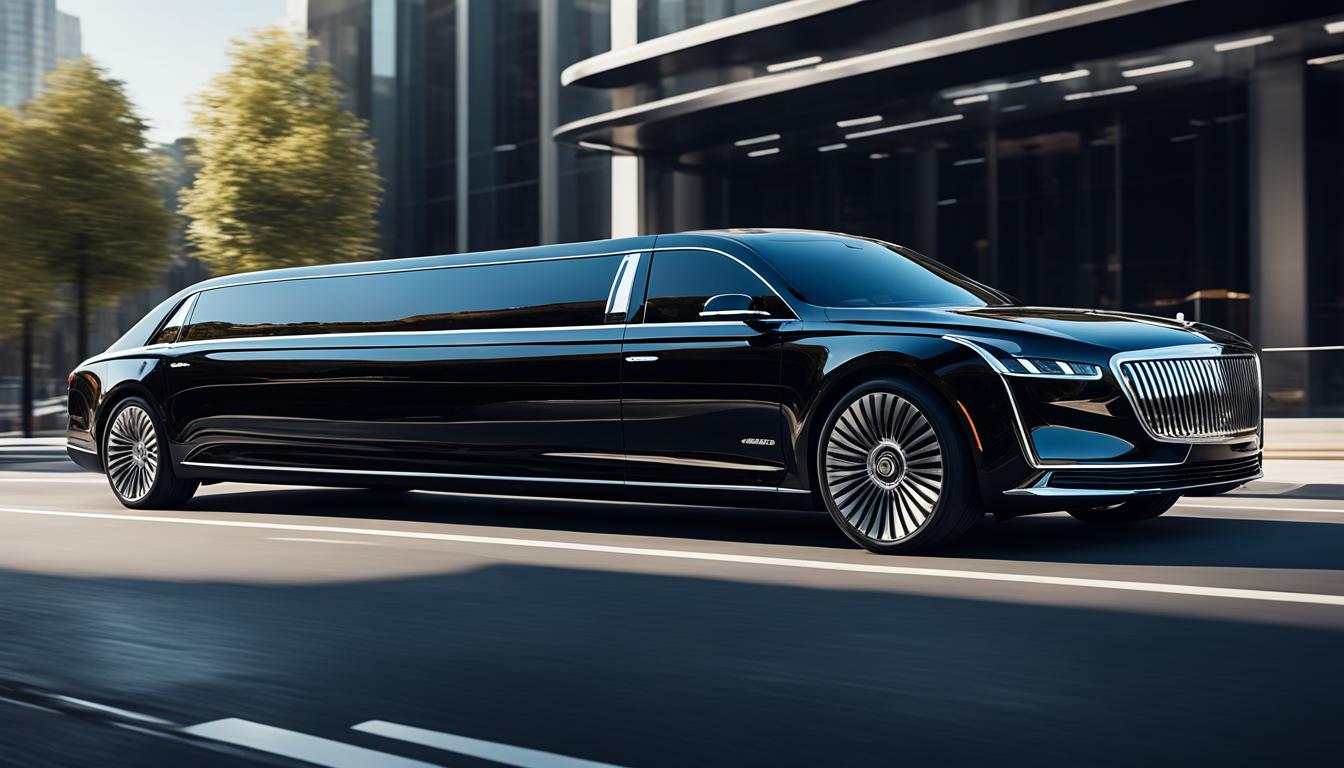
The future of AI in transportation looks bright, especially for making things better all the time. Thanks to the internet, AI systems can get smarter from data. So, logistics get even more intelligent and forward-thinking. For example, DHL uses AI to plan routes, making deliveries quicker and greener. Honeywell relies on AI to run its robots that sort orders, making warehouses 40% more efficient.
According to Statista, 60% of companies foresee big changes with robotic process automation (RPA) by 2025. This includes automating things like stock checks, running warehouses, checking quality, and fixing things before they break.
For limo businesses, using AI means not just working better but also understanding clients more deeply. They can adjust their services based on what their customers really want. This approach brings customized service. It boosts how happy customers are and makes everything run smoother.
| AI Solution | Efficiency Gain |
|---|---|
| AI-enabled route optimization | Up to 10% reduction in fuel usage |
| Predictive maintenance using AI | Reduced downtime and repair costs |
| AI-driven demand forecasting | 20-50% reduction in supply chain errors |
| AI-powered robotic systems | Up to 40% increase in warehouse throughput |
As transport changes, it’s smart for limo firms to invest in AI. It helps them beat the competition and offer outstanding service to their top customers.
Data-Driven Insights Through Machine Learning
Limo companies are now using AI in the transportation sector for big wins. They’re tapping into machine learning in transportation and data analytics. This helps them understand what customers really like, know the latest market trends, and find better ways to run the business. By using AI in the transportation world, these companies are becoming leaders in finding innovative ways to please their customers.
Take smart traffic control or figure out the best routes as AI in transportation examples. These make limo rides safer and marketing smarter. The use of AI in planning lets these companies make smarter choices using data. This way, they can spot what’s not working, save money, and use their vehicles better.
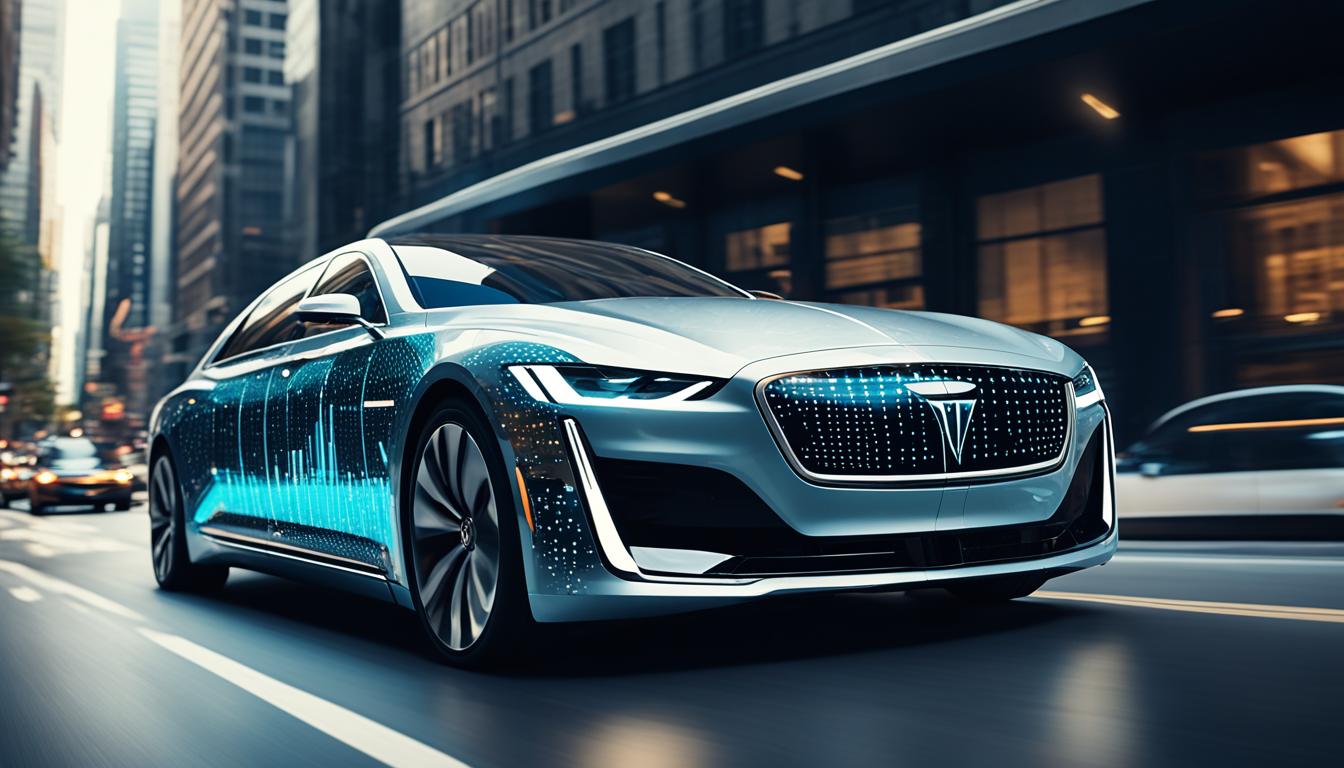
By 2031, it’s predicted that AI in the global logistics market will be worth almost USD 239 billion. From just under USD 8 billion in 2022, this is a huge leap forward. It shows just how much AI in the transportation field, including the limo industry, is about to grow.
| Industry Insights | Impact of AI |
|---|---|
| Traffic Flow Analysis | AI and advanced analytics are transforming traffic flow analysis, leading to reduced congestion and more efficient travel. |
| Customer Experience | AI technology enhances the customer experience with real-time updates, personalized route recommendations, and contactless payments, resulting in more efficient, convenient, reliable, and personalized journeys. |
| Parking Assistance | AI-powered parking assistance reduces search times and emissions by providing real-time updates on available parking spots, cutting down on congestion and improving space utilization. |
| Toll Collection Systems | Intelligent toll collection systems enhanced by AI lead to better-managed and financed road networks, reducing congestion and making roadways more efficient. |
Improving Traffic Management Systems
In the luxury limo world, the future of artificial intelligence looks bright. The estimated cost for AI in transportation may hit around USD 23.11 billion by 2032. This is a huge leap. Traditional traffic predictions are not as good as machine learning models. They’re more precise and offer better ways to forecast traffic flow.
There’s also talk about AI-powered traffic lights making a difference. They’d lessen traffic by changing signals in real time based on how busy the road is. As artificial intelligence gets better, the future of planning for transportation will be more about using data. This will help limo services not just keep up but lead the way in top-notch service.
Scalability
Transportation businesses are starting to use AI more. This lets them easily grow to meet the higher demand. With AI applications in transportation, companies can manage capacity better, set prices dynamically, and allocate resources well.
Limo services, for example, can use AI to make their work smoother. They can change with the market, and add new services, but still keep their quality high and customers happy.
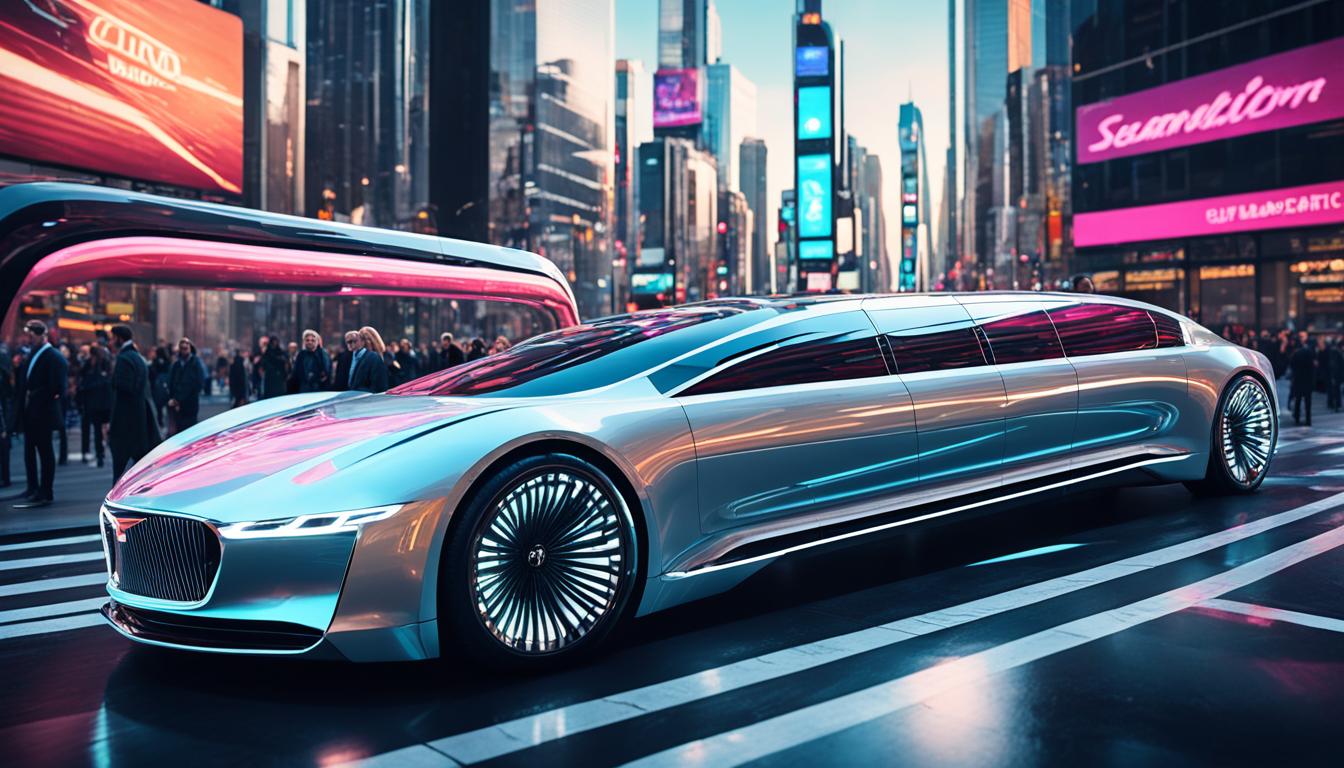
Hyperscience is at the forefront of AI tech and shows how powerful AI can be for growth. Their AI tools automate tasks, helping companies do things more efficiently. They even managed to process 36 million data points for a supply chain company in a year. This proves AI can handle a lot of data well.
Hyperscience’s AI tech lets companies grow big without needing lots more workers.
By using AI like Hyperscience’s, transportation firms can be seen as leaders. They can quickly process documents, offering accurate data, and making work easier for their staff. Plus, it makes it easier for new tech to be used in their operations.
| Industry Impact | AI Adoption |
|---|---|
| 65% of logistics company leaders consider AI as an important technology for the next three to five years. | As of 2018, 1 in 4 public transport managers are already utilizing AI for real-time operations management and customer analytics. |
| Canada’s ACATS Program offers up to $2.9 million in funding for companies to Advance Connectivity and Automation in the Transportation System. | Singapore aims to create “intelligent freight planning” by 2030 as part of its national AI strategy. |
Successful tests with machine learning in transport are happening all over. But, while there are many tests that work, not as many final solutions are out there yet. This shows there are still big challenges in putting AI into full use. Even so, businesses that do use AI in transportation can beat these challenges. They can lead the way, making big changes in the transport world.
Conclusion: The Future of AI in Transportation
The future of transportation is getting a big upgrade through AI integration. This change is promising to completely reinvent how we move around. With AI’s help, tasks like managing traffic intelligently, planning routes, and running public transport are transforming.
Thanks to autonomous cars, computer vision, and language processing, artificial intelligence is changing the game. It’s not just about making things smoother. It’s also about making travel safer, more efficient, and kinder to the planet. AI in the transport field promises to cut down on traffic, lower pollution, and upgrade how we get around.
Embracing AI tech is key to staying ahead in the transport arena. It’s essential for facing the challenges of a competitive, tech-forward world. Adding AI to the mix can make everything work better, from how luxurious limos run to day-to-day transport operations for special events, corporate transportation, point-to-point service, and more.
Not being part of this AI-driven revolution is not really an option. The new system can fit with what’s already in place, making a smooth move to a smarter, data-powered transport world. It changes how we plan our trips, manage the flow of vehicles, and use computer vision and AI-powered voice assistance. In short, AI in transport is about making moving around exceptional.
For those seeking the pinnacle of luxury and innovation in travel in the tri-state area, Riga Global Travel & Limousine Service stands as the leader in Luxury AI-Enhanced Transportation Solutions. Our cutting-edge technology ensures that your journey is not only comfortable and stylish but also seamlessly integrated with the latest advancements in AI. Visit Riga Global Travel & Limousine Service at their Stamford, CT location or NYC location or call toll-free (888) 379-7888 or (212) 850-0900 for an unparalleled, intelligent transportation experience.

